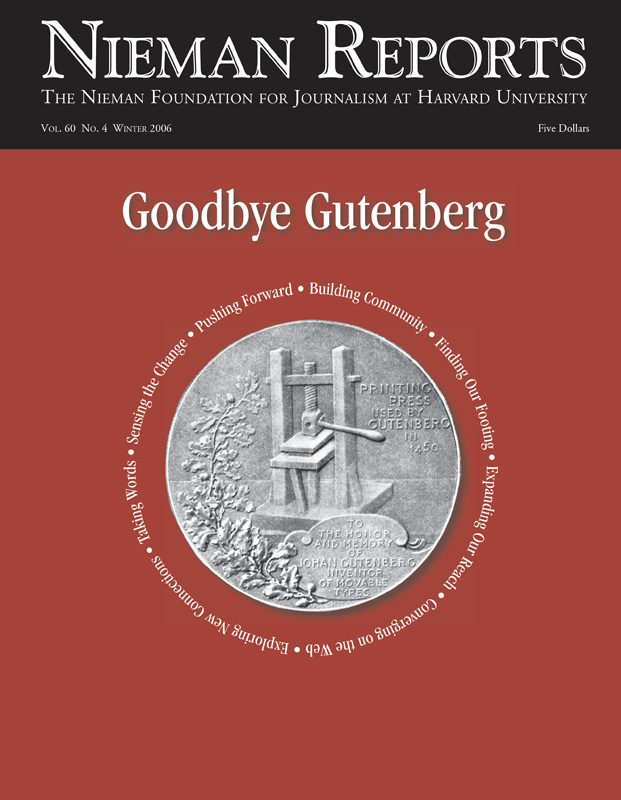I wonder if we could begin by just throwing a few notions onto the table. Not that we'd seek to agree on them. Just put them out there, take care of everyone's itch to proclaim—and see if this could kind of ease our way into the heart of things.
Let's say, for instance, that longtime journalists can be confoundingly oblivious to the vast opportunities of the digital world and insufferably sure that their way is the only way. Let's say new-media hotshots tend to confuse hooting something down with analyzing it and are possessed of a regrettable infatuation with the charm of their insults. Let's say it's not our fault that citizens are entertaining themselves silly rather than feeding at the deep pool of substance. And also that the wisdom of the many is far greater than the wisdom of any single journalist or news organization. Let's say that Wall Street ... well, enough. You get the drill. If we throw out a few of these gotta-get-it-said messages, can we then move on (as we so rarely seem to do) to the challenge: How do we guarantee to our democracy a continued supply of the information essential to it?
This "yes, but what can we do about it now?" approach can find useful application in many a different discussion. Take media ownership. If we can't restore the business model that's collapsing around us, we can figure out what works about it and what doesn't, what are the needs that exist and what are the various ways they might be met. There are lots of possible approaches. Those who wish to do what they can to strengthen the existing media model might push for different board structures, incentives for responsible investing, or punitive taxes on short-term stock trading. A coalition of veteran editors and publishers might want to put their experience at the service of struggling new media owners.
Others could ponder different ownership models. Many a nonprofit is doing fine work; consider the investigative reporting of the Center for Public Integrity (acknowledgment: I'm on the board). How could more such models be encouraged? Or what public policy changes could ease the way for media company owners to return from public to private ownership? Or, in rarer instances, such as that of The Anniston (Ala.) Star, what could happen to turn newspapers into nonprofit operations? And how can we better spread the word about the astonishingly rich and promising array of public interest work on the Web, so as to encourage more entrepreneurialism among "old-media" journalists?
Or consider the question of how to guide (and speed) journalism's transition in these unsettled times. Some will want to pursue means of ensuring that core principles—such as verification and on-the-ground reporting—are translated RELATED WEB LINKS
"New Media, Enduring Values"
–www.journalism
.missouri.edu
Public Insight Journalism
–americanpublicmedia
.publicradio.org
"Manifesto for Change" (PDF)
–www.annenbergpublic
policycenter.orgeven more richly onto the Web. Others will work on fusing the power of citizens' knowledge with the principles and processes of journalism, as is being done by American Public Media with its Public Insight Journalism project. Others will want to gather journalists (moving across the old/new-media border) to grapple with objectivity, verification, accountability, transparency, how to make journalism more professional and also more responsive—and how to protect freedom of information.
I have found, in trying to pierce the gloom and get word out about the many possibilities through my immodestly named "Manifesto for Change" that we are all too ready to spot and voice the "no ways." No way can we talk about a role for government (um, how about those Sunshine Laws?). No way can we sit down with the publishers. No way, no way.
Yeah, yeah. We've heard it all. We'll hear it again. Just lay it on out there—and then (please) let's move on.
Geneva Overholser, a 1986 Nieman Fellow, is Curtis B. Hurley Chair in Public Affairs Reporting at the Washington bureau of the Missouri School of Journalism.
Let's say, for instance, that longtime journalists can be confoundingly oblivious to the vast opportunities of the digital world and insufferably sure that their way is the only way. Let's say new-media hotshots tend to confuse hooting something down with analyzing it and are possessed of a regrettable infatuation with the charm of their insults. Let's say it's not our fault that citizens are entertaining themselves silly rather than feeding at the deep pool of substance. And also that the wisdom of the many is far greater than the wisdom of any single journalist or news organization. Let's say that Wall Street ... well, enough. You get the drill. If we throw out a few of these gotta-get-it-said messages, can we then move on (as we so rarely seem to do) to the challenge: How do we guarantee to our democracy a continued supply of the information essential to it?
This "yes, but what can we do about it now?" approach can find useful application in many a different discussion. Take media ownership. If we can't restore the business model that's collapsing around us, we can figure out what works about it and what doesn't, what are the needs that exist and what are the various ways they might be met. There are lots of possible approaches. Those who wish to do what they can to strengthen the existing media model might push for different board structures, incentives for responsible investing, or punitive taxes on short-term stock trading. A coalition of veteran editors and publishers might want to put their experience at the service of struggling new media owners.
Others could ponder different ownership models. Many a nonprofit is doing fine work; consider the investigative reporting of the Center for Public Integrity (acknowledgment: I'm on the board). How could more such models be encouraged? Or what public policy changes could ease the way for media company owners to return from public to private ownership? Or, in rarer instances, such as that of The Anniston (Ala.) Star, what could happen to turn newspapers into nonprofit operations? And how can we better spread the word about the astonishingly rich and promising array of public interest work on the Web, so as to encourage more entrepreneurialism among "old-media" journalists?
Or consider the question of how to guide (and speed) journalism's transition in these unsettled times. Some will want to pursue means of ensuring that core principles—such as verification and on-the-ground reporting—are translated RELATED WEB LINKS
"New Media, Enduring Values"
–www.journalism
.missouri.edu
Public Insight Journalism
–americanpublicmedia
.publicradio.org
"Manifesto for Change" (PDF)
–www.annenbergpublic
policycenter.orgeven more richly onto the Web. Others will work on fusing the power of citizens' knowledge with the principles and processes of journalism, as is being done by American Public Media with its Public Insight Journalism project. Others will want to gather journalists (moving across the old/new-media border) to grapple with objectivity, verification, accountability, transparency, how to make journalism more professional and also more responsive—and how to protect freedom of information.
I have found, in trying to pierce the gloom and get word out about the many possibilities through my immodestly named "Manifesto for Change" that we are all too ready to spot and voice the "no ways." No way can we talk about a role for government (um, how about those Sunshine Laws?). No way can we sit down with the publishers. No way, no way.
Yeah, yeah. We've heard it all. We'll hear it again. Just lay it on out there—and then (please) let's move on.
Geneva Overholser, a 1986 Nieman Fellow, is Curtis B. Hurley Chair in Public Affairs Reporting at the Washington bureau of the Missouri School of Journalism.



